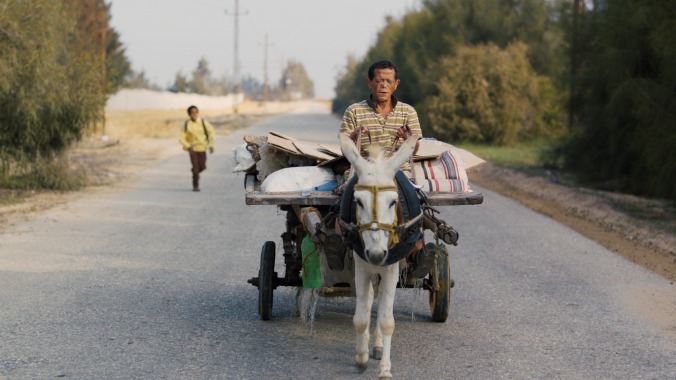The Oscar-submitted Yomeddine is a sentimental but affecting ode to friendship among outcasts
Film Reviews Movie Review

Egyptian-Austrian director A.B. Shawky’s feature debut Yomeddine, which premiered at the Cannes Film Festival last year and was Egypt’s official entry for Foreign Language Film consideration at the 91st Academy Awards, is humanist filmmaking through and through. An often-sentimental road movie that tracks two outcasts across Egypt in search of home, Yomeddine is carried along by strong performances from its central pair of actors, Rady Gamal and Ahmed Abdelhafiz, whose affection for each other permeates throughout a narrative of both tragedy and triumph.
Yomeddine begins in a leper colony in the northern Egypt of present day, which Beshay (Gamal) has called home for nearly his entire life. He can remember being dropped off there by his father, as a young boy with a fabric bag over his face. But over time, his leprosy healed and he grew up, falling in love and getting married. Beshay rummages through an area called Garbage Mountain, collecting videotapes, scrap metal, and other items to sell, and he has a group of friends with whom he shares laughs and stories at the end of the day. Whatever life had been for him before his arrival in the leper colony is a distant memory.
But when his wife passes away and a relative of hers unexpectedly attends the funeral, Beshay begins to wonder whether he has family of his own, perhaps still living in the city of Qena, where he spent his childhood. Determined to connect with any remaining relatives, Beshay packs up all his belongings and guides his beloved donkey Harby south, along the Nile, unaware that a young orphan boy he’s befriended, Obama (Abdelhafiz), has stowed along. Together, they begin a journey that will put them in contact with Egyptians from all walks of life: Some attempt to swindle them, some befriend them, and most either ignore or fear them—an onslaught of mistrust and suspicion that drives the pair to their breaking point.
Shawky, directing from his own script, provides glimpses into various Egyptian communities and subcultures here, from the camaraderie and humor present in the leper colony to the somber unity of the mosque where Obama stops to pray to the scorn and disinterest of police officers and bureaucrats. Cinematographer Federico Cesca (who shot Patti Cake$ and Roxanne Roxanne) communicates the difficulty of Beshay and Obama’s journey with wide-angle shots that center the two in moments of great loneliness, such as Beshay standing sentinel over his wife’s grave and Obama gazing over a set of train tracks that disappear into the desert.
Those visuals are complemented by Shawky’s tight focus on Beshay and Obama’s perspectives. Their discussions about religion, their opinions of the locations where they travel, and their dreams for the future are open and empathetic. And as regularly as outsiders reject either one or the other, the man and the boy ultimately find companionship in other people they meet along the road who self-identify as “freaks,” offering them food and shelter, recognizing that Beshay’s scars and Obama’s Nubian heritage are no reason to reject them.
There’s a lovely chemistry between Gamal, who Shawky met at Egypt’s Abu Zaabal Leper Colony, and Abdelhafiz. Both first-time actors, they capture the dynamic of two people pushed away from society who genuinely grow to feel love for each other. A scene where Obama marvels at Madonna’s blond hair on the cover of a Dick Tracy-era magazine that he spots in Garbage Mountain works because of Beshay’s light mocking of Obama’s shock; later on, when Obama slowly guides Beshay through a Muslim prayer service, there’s that same gentleness. Their partnership is in stark contrast to the casual cruelty of most of the people they meet, who either treat Beshay as a monster or Obama as a criminal. It’s immensely satisfying when Obama blows his nose into a river where they’re bathing after a woman worries that her children will catch leprosy from Beshay, but the movie doesn’t overdo those vengeful moments. The same goes for the humor, which provides Beshay some real depth, preventing him from becoming a character who exists only to be pitied.
Still, Yomeddine sometimes leans too hard on a familiar kind of sentimentality—you can guess that the veiled hat Obama makes for Beshay to cover his face will at some point be integral to a scene of self-actualization—and the film’s ending in particular provides sympathy to characters whose actions perhaps don’t justify such grace. But perhaps that is to be expected for a film that is named after the religious concept of the Day Of Judgment, an afterlife when all will be equal, even Beshay and Obama and the other outcasts they meet along the way. “We’ll meet again,” one of those men says to Beshay, and that moment of hope is a distillation of Yomeddine’s earnest desire to provide humanity to unseen pockets of Egyptian life.
1 Comment
“IT’S FEAR OR BE FEARED, KID”-Someone in this movie, probably (not)